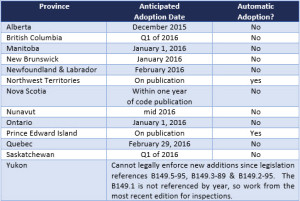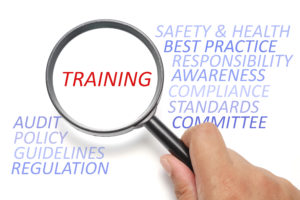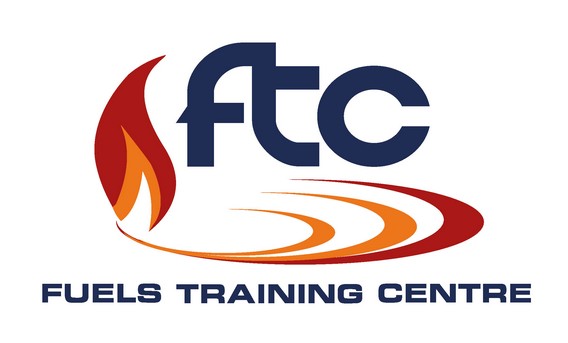Tag Archives: B149.3
Adoption of 2015 Versions of B149 Codes
This article, related to the adoption of 2015 versions of B149 codes, first appeared in the 2015 Jul/Aug edition of Propane Canada Magazine.
I recently chaired the CSA B149.1 Natural Gas & Propane Installation Code Technical Committee meeting and attended as a member of the CSA B149.2 Propane & Storage & Handling Code Technical Committee meeting Niagara Falls, Ontario.
As you are all aware CSA will be publishing the latest editions of the B149 series of Codes in August 2015. I thought this would be an opportune time to provide information on the provincial and territorial adoption dates of the Codes and to reiterate a couple of sections of the new Code that I believe need to be highlighted, namely maintenance and operating procedures and PRV replacement in cylinders.
Also, this edition of Propane Canada magazine is focusing on temporary heat; so I thought it would be appropriate if I highlighted some of the key regulatory changes coming in the next Code edition with respect to construction heating.
Adoption of 2015 CSA Codes
One of the agenda items was the adoption of the 2015 B149 series of codes. The following chart provides the latest proposed adoption dates for each of the provinces and territories. While this is the latest information available it is best to follow up on a regular basis with your provincial or territorial Authority Having Jurisdiction to see if the dates listed will actually be implemented.
Why You Need to Obtain the 2015 Codes
B149.2 Edition
The following are some of the highlights of the 2015 edition of the B149.2 Propane Storage & Handling Code:
- Transfer of clauses to other standards in the B149 Series to make the Code more comprehensive and streamlined;
- New definitions for construction sites, cylinders in storage and connected for use;
- New clauses for construction sites, tank heaters, vaporizer installations and propane storage facility operation and maintenance.
B149.1 Edition
The following are some of the highlights of the 2015 edition of the B149.1 Natural Gas & Propane Installation Code:
- Updated scope provides guidance on metallic fittings, stainless steel tub-ing, pressure regulators for propane vehicle usage, direct gas-fired pro-cess air heaters and more;
- Consolidated clauses from other Codes in the B149 Series make the Code more comprehensive and streamlined;
- New clauses for mobile homes, rec-reational vehicles, highway vehicles, outdoor food service units, and wash-mobiles include specialized re-quirements;
- Simplified references and definitions allow for improved application of the standard’s clauses.
Pre-Order Codes
CSA is currently offering, on their web-site, several different 2015 B149 Code packages that you can pre-order. CSA will also be publishing a handbook for the B149.1 Code. The latest technological advancement is a complete inter-active version of the B149.1-15 and the B149.1-15 Handbook for your iOS or Android tablet or mobile device.
New Propane Facility Maintenance Requirements
The purpose of the new clauses in the code is to provide a minimum standard for the operation and maintenance of propane facilities and equipment. The new clauses apply to tank systems, filling plants, container refill centres and other facilities where liquid propane is piped to a vaporizer or process. Because there are many variables, it is not possible to prescribe a set of operation and maintenance procedures that will be adequate from the standpoint of safety in all cases without being burdensome and, in some cases, impractical. Industry association publications and training programs provide guidance to individuals preparing site specific procedures and may be referenced. The proposed clauses establish a baseline or minimum standard.
The maintenance procedures are to cover testing, inspection, monitoring and documenting of the equipment, its repair, and general upkeep.
There is also a requirement for persons who perform maintenance on facility propane systems to be trained in the hazards of the system and in the maintenance and testing procedures applicable to the facility.
Replacement of PRVs for Propane Cylinders with Dome Covers
This requirement addresses the conflict between the B149.2 Code and the CSA-B339 Standard currently adopted by Transport Canada. The new clause means that the owner of a propane cylinder equipped with a pressure relief valve, previously exempted from replacement by their installation under the dome cover, will now have no conflicting requirement to be used as an argument for not replacing the pressure relief valve at the time of the 10-year cylinder inspection and requalification.
In fact, the new clause is very specific by stating that the PRV is to be removed and replaced with either a new relief valve or one that has been tested to and complies with CGA S 1.1, and found acceptable for use. The clause also requires that a replacement valve has the PRV and dip tube length sized for the cylinder.
There are also new record-keeping requirements listed in the Code which require the facility conducting the visual inspection and requalification to maintain records showing the results of the inspection and requalification until the date of expiration of the requalification period; or the date the cylinder is reinspected.
Personally, it is my opinion that anyone not already replacing the PRV, at the time of requalification of cylinders, such as 420 lb. propane cylinders have been putting non-compliant propane cylinders back into service. The requirement to replace the PRV at the time of the visual inspection and requalification for PRVs protected by a dome cover has been in the CSA-B339 for several years.
Temporary Construction Heat
The chart indicates that provinces will be adopting the 2015 Codes in the middle of this heating season. This means that you must be aware of the new and amended requirements for temporary construction heat. The main focus of the new requirements is the storage, handling and use of propane cylinders at construction sites.
In order to understand how the new requirements will impact their day-to-day activities, cylinder delivery and bulk truck drivers who service the sites must have the knowledge of how to comply with the new requirements.
New 2015 B149.2 Definitions
Connected for Use – this new definition is to clear up the confusion as to whether the propane cylinder is in use or storage when connected to a construction heater and the construction heater is not operating. The definition stipulates that a propane cylinder connected to an approved appliance (construction heat-er) regardless of whether the heater is operating or not is to be considered in use, not storage as some have interpret-ed in the past.
Construction Site – the clause expands on what exactly is a construction site and provides the guidance as to when the site can be considered a construction site for the storage, installation, and use of propane cylinders.
New or Amended Clauses
Cylinder Not Connected for Use – requires cylinders not connected for use to be housed in acceptable storage sites and further clarifies that a propane cylinder connected for use is not considered in storage.
Storage of Cylinders – Provides storage requirements and, under certain conditions, permits cylinders to be stored on the roof of buildings under construction and clarifies acceptable “outdoor” storage by identifying proper and safe storage options that reflect conditions on construction sites. The requirements are based on the hazards (gas accumulation, vehicular traffic, hoisting, etc.), rather than focusing on the location alone.
Presently, rules from various parts of the Code that were not intended to address construction activities are being referenced to regulate construction activities. Even with changes to the 2010 version, it is a struggle to understand which sections of the B149.2 are likely to be applied on construction sites by an inspector. The result is confusion for workers and trainers on what constitutes compliance, in-consistency in enforcement, and disagreement on the job site over safety.
Moving Cylinders – When moving propane cylinders on construction sites by elevator, hoist, or escalator, it was only assumed that other clauses within the Code not specifically related to a construction site would not be referenced and applied on construction sites. The new specific clause with some modification for construction, makes the acceptable means clear to both users and regulators.
In Conclusion
It’s imperative that supervisors, propane technicians and those who deliver cylinders and bulk propane are familiar with the latest Code requirements. To be proactive, a person should order and obtain the latest editions of the Codes from CSA as soon as the Codes are published in August 2015. This will give an opportunity to train on the latest requirements and to understand the impact these new requirements will have on your company prior to their adoption by the Authority Having Jurisdiction in your province or territory.
The Fuels Learning Centre offers training programs addressing the 2015 Code requirements for cylinder requalification (Visual Inspection & Requalification of Propane Cylinders – SO01) and the use of temporary construction heat (Construction Heaters and Propane Cylinders at Construction Sites – AV02).
Alberta Municipal Affairs, Safety Services Issues Variance Related to Site-Specific Gas-Fired Process Equipment
Nova Scotia Labour and Advanced Education Issues Directive Related to the Field Approval of Uncertified Equipment
BCSA Issues Directive Related to Custom Built Gas Fire Displays and Uncertified Outdoor Fireplaces
Keeping Regulatory Training Current
Most records of training for compliance training are valid for three years. A lot can happen in terms of regulatory requirements in three years. This article, summarizes information from two articles which first appeared in the Sep/Oct and Nov/Dec 2014 editions of Propane Canada Magazine. This article discusses the importance of ensuring you are keeping regulatory training current so that your employees remain properly trained.
As detailed in previous articles earlier this year the B149.1 – Natural Gas and Propane Installation Code and the B149.2 – Propane Storage and Handling Code have been extensively amended for publication by the Canadian Standards Association in 2015.
Also, the B149.3 – Code for the Field Approval of Fuel Related Components on Appliances and Equipment and the B149.5 – Installation Code for Propane Fuel Systems and Tanks on Highway Vehicles will have new Codes published by the Canadian Standards Association in 2015.
The provincial adoption of the 2015 codes will start to take place sometime after January 2015. Some provinces adopt the codes as soon as they are published, while other provinces adopt several months later. It is, therefore, important that, as users of the Codes, you are aware of when your particular province will adopt the Codes that regulate the work you perform.
Ontario Adoption of Codes
 Ontario has issued an Ontario Code Adoption Document (CAD) for both 2010 editions of B149.1 and B149.2 codes which become effective October 1, 2014. The CAD adopts many of the changes that will appear in the 2015 editions of the B149.1 and B149.2 codes. The CADs are available on the TSSA website for download. Significant changes made by the Gaseous Fuels amendment include:
Ontario has issued an Ontario Code Adoption Document (CAD) for both 2010 editions of B149.1 and B149.2 codes which become effective October 1, 2014. The CAD adopts many of the changes that will appear in the 2015 editions of the B149.1 and B149.2 codes. The CADs are available on the TSSA website for download. Significant changes made by the Gaseous Fuels amendment include:
- Permitting press-connect fittings;
- Re-classifying clothes dryers in accordance with the certification standard;
- Adding a new section regulating unvented heaters installed in livestock or poultry facilities;
- Incorporating Director’s Order FS-051-04 (re B-Vents not certified for exterior applications installed outdoors) into the code, for ease of reference; and
- Adoption of TSSA-MFSE-2014 for field approval of mobile food service equipment.
The Propane Storage & Handling Code Adoption Document adopts the 2010 edition of the Code and new requirements approved by the B149.2 and B149.5 Code Committees for the 2015 Code which are considered important to be implemented in Ontario now and addresses gaps in the current codes to enhance safety.
Major changes in this version include the following:
- New definitions added for “construction site” and “cylinder exchange”;
- New requirements for cylinder storage, including storage at construction sites and rooftops;
- New requirements for cylinder exchanges;
- Reiterating the need for compliance with Branch Standard #9 or a full risk and safety management plan for facilities in heavily populated or congested areas; and
- New certification requirements for valves, components, and accessories for propane vehicle conversion; replacing IGAC Protocol 01-97.
Code Updates Referred to in TDG Regulations
At the same time there is a new, 2014 edition of the B620 – Highway Tanks and Portable Tanks for the Transportation of Dangerous Goods and B622 – Selection and Use of Highway Tanks, Multiunit Tank Car Tanks, and Portable Tanks for the Transportation of Dangerous Goods, Class 2.
While Transport Canada recently adopted the 2009 editions of the CSA/B620 and CSA/B622, the 2014 editions are completed and ready for adoption. It is important for one to keep abreast of the latest Codes and Standards as you know eventually any new requirements will become law.
Training Requires Updating
Once the Codes and Standards are adopted there will be an immediate training need for persons who perform work that is regulated by these documents. In Ontario, this is October 1, 2014, which means that training programs that are used by the propane industry to train people must reflect the latest regulatory requirements as of October 1, 2014, for Ontario and in other provinces early next year.
This does create some issues as the current Record of Training (ROT) retraining requirements are once every 3 years, which means that people can actually be working in the field for up to 3 years before they are trained on the new regulatory requirements.
Given that 2015 is the year for the issuance of new codes it may be advisable for employers in certain segments of the industry such as gas technicians, propane cylinder, cargo liner and bulk delivery and propane construction heating, to have their employees trained on the new requirements rather than wait until such time that the person’s ROT is up for renewal.
One of the largest impacts is going to be in the construction industry where the requirements for the storage and use of cylinders have been extensively amended. If your cylinder delivery driver is not aware of the new requirements he could inadvertently create a non-compliance situation which could result in fines and disruption of service to your customer.
For example, Ontario Director’s Order FS-095-06, issued November 2013, states that “when distributors provide fuel to tanks or cylinders not connected to the premises, the distributor shall ensure that the fuel storage is compliant with Ontario Regulation 211/01”.
If not aware of the new requirements, the contractor who uses the propane cylinders and construction heaters can also inadvertently create a non-compliant situation which could result in fines and impact the ongoing construction of the building. The contractor could also be at a disadvantage from an efficiency perspective if he does not know the new requirements with respect to the use and storage of propane cylinders on rooftops.
Another example is the increased size of cylinders which may be stored in cylinder exchange cabinets. Due to demand from the RV industry, the maximum was changed from 20 lb. 30 lb. cylinder sizes. The cabinet maximum capacity of 500 lb. (25 x 20 lb., or 16 x 30 lb., or a combination thereof) has been maintained. If you were not aware of these new requirements you could be missing out on an opportunity to serve the recreational market with the larger propane cylinders.
The CSA-B620-14 has new requirements for “off truck emergency shutdown system” to include tanks in non-metered propane delivery as well as engine shutdown when the engine air intake senses flammable vapors. When adopted, drivers of unmetered deliveries need to be trained in the inspection and use of these new requirements
It does not make economical or practical sense to train people with outdated training programs. As indicated by the examples above it is crucial to one’s business that employees are trained in understanding the latest regulatory requirements.
Status of publication of the 2015 series of CSA Codes and Standards
2015 B149.1 – Natural Gas & Propane Installation Code
The committee last met on June 12, 2014. Public Review took place from March 12 to May 12, 2014; and all comments were dispositioned and resolved. There was a general consensus on the draft and it proceeded to the editing stage. The ballot for the approval of the Code has been issued for committee review. A meeting of the Technical Committee (TC) will take place in February 2015 if needed for the disposition of ballot comments. Publication in both English and French is scheduled for August 2015. The next Technical Committee meeting is planned for the week of June 8, 2015, in Niagara Falls, ON.
2015 B149.2 – Propane Storage & Handling Code
The committee last met on June 11, 2014. Public Review took place from March 12 to May 12, 2014, and all comments were dispositioned and resolved. There was a general consensus on the draft and it proceeded to the editing stage. The ballot for the approval of the Code has been issued for committee review. A meeting will take place in February 2015 if needed, for the disposition of ballot comments. Publication in both English and French is scheduled for August 2015. The next Technical Committee meeting is planned for the week of June 8, 2015, in Niagara Falls, ON.
2015 B139 – Installation Code for Oil Burning Equipment
The Technical Committee last met on June 24-26, 2014 to disposition Public Review comments and finalize the technical content in the Draft. The ballot for the approval of the Code took place from Sept. 3 to Oct. 3, 2014. The scope has been changed to include fuel oil storage tanks of all sizes including underground tanks. The Code is now divided into two major parts, B139.1 – Large Installations and B139.2 – Residential and Small Commercial Installations. Publication is scheduled for April 1, 2015, in both English and French.
Gas Appliances and Related Accessories
The CSA Gas Technical Committee held a joint meeting with the U.S. Z21/83 Technical Committee on Sept. 30. 2014. The following new standards were approved:
- CSA 3.8, Gas-fired Equipment for Drying Crops;
- Z21.10.1/CSA 4.1, Water Heaters Volume 1; Z21.10.3/CSA 4.3, Water Heaters Volume Ill;
- Z21.54/CSA 8.4, Gas Hose
- Connectors;
- Z21.19/CSA 1.4, Refrigerators Using Gas Fuel;
- Z21.56/CSA 4.7, Pool Heaters; and
- Z21.58/CSA 1.6, Outdoor Cooking Appliances.
Oil Burning Appliance Standards (B140 Series, B211 & B212)
The B 140 series of Standards have been reaffirmed; however, they are in need of review and updating. The last Technical Committee meeting was held on May 2, 2012. CSA will be looking at reconstituting the TC to begin work on these documents.
Carbon Monoxide Detectors Standard
The Technical Committee has been reinstituted for a new edition of the CSA 6.19 standard. The TC’s first meeting was Sept. 25, 2014, with the publication date projected for September 2016.
Introduction of the Fuels Learning Centre
Recent events provided a business opportunity for me to partner with Bill Egbert in the creation of a new training provider for the fuels industry. The company is called Fuels Learning Center Limited (FLC) which will not only provide training modules to the propane industry but also the fuel oil and natural gas industries.
As most of you are aware Bill was for many years, the General Manager of the Propane Training Institute. I was under contract to the Canadian Propane Association to write new training programs and update existing programs with the latest technical and regulatory requirements.
The Fuels Learning Centre currently has nine provincially approved training courses which reference the latest regulatory requirements of the Codes and the Standards to be adopted:
- Filling Propane Cylinders and Auto Propane Tanks at Retail Filling Centres (CF03)
- Filling Propane Cylinders at Retail Filling Centres (CF01)
- Filling Auto Propane Tanks for Propane Vehicle Operators (CF02)
- Loading and Unloading Propane Cargo Liners (TO01)
- Loading and Unloading Propane Tank Trucks (TO02)
- Cylinder Delivery Truck Operations (TO03)
- Construction Heaters, Torches & Propane Cylinders at Construction Sites (AV01)
- Construction Heaters and Propane Cylinders at Construction Sites (AV02)
- Hand-Held Torches and Propane Cylinders at Construction Sites (AV03)
These programs, when successfully completed, will provide the provincially acceptable ROT and where required the TDG qualifications for persons who need to be trained in the handling and use of propane. We have been able to streamline these programs to focus more on what a person needs to know and less of what is not required to know to safely perform their tasks.
Alberta Municipal Affairs Issues Bulletin Related to Legacy Equipment Management Systems
This Information Bulletin (G-02-14) clarifies the requirements to obtain a variance for gas-fired process equipment in the Alberta Oil and Gas industry installed prior to July 2013.








